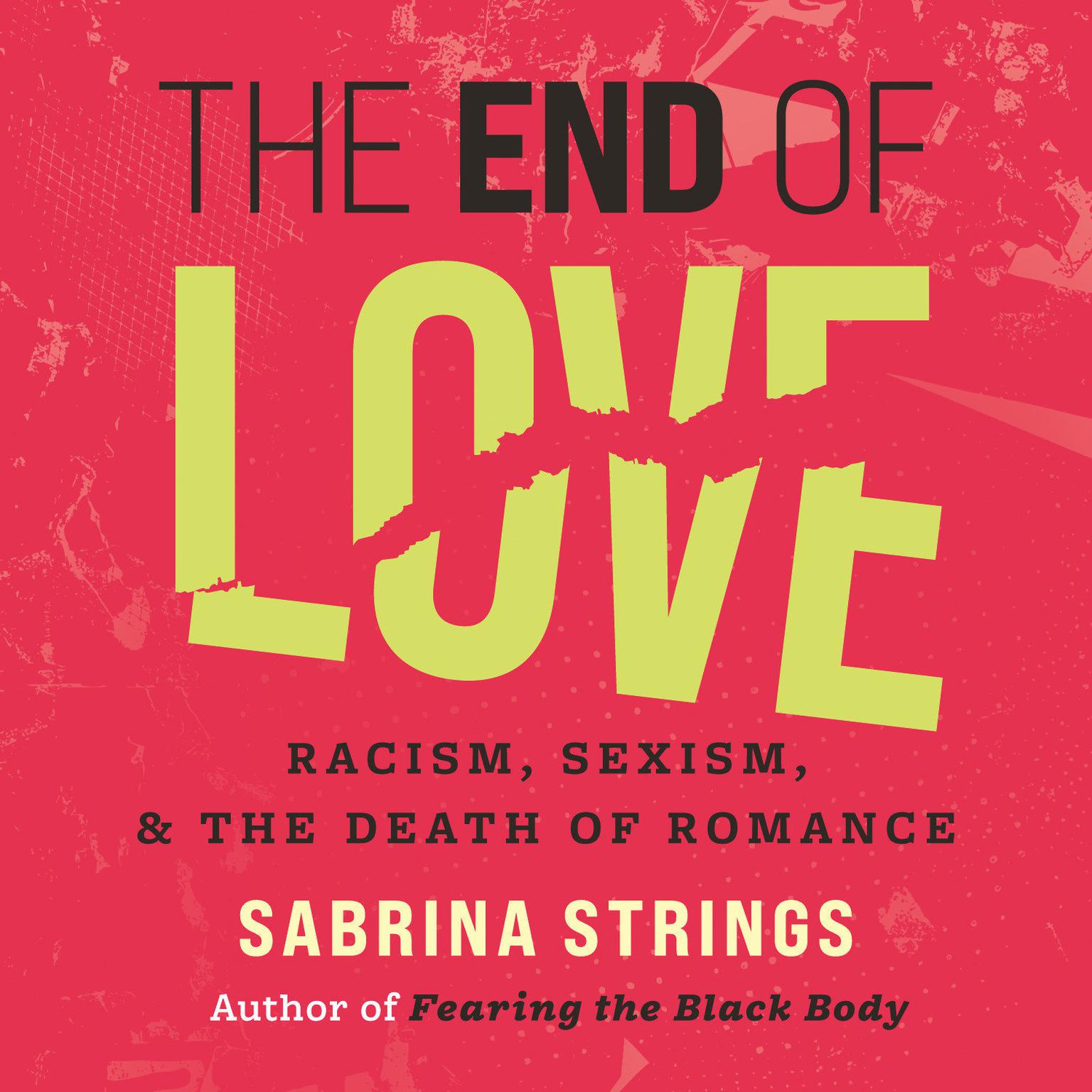 Play Audiobook Sample
Play Audiobook Sample
The End of Love: Racism, Sexism, and the Death of Romance Audiobook
 Play Audiobook Sample
Play Audiobook Sample
Quick Stats About this Audiobook
Total Audiobook Chapters:
Longest Chapter Length:
Shortest Chapter Length:
Average Chapter Length:
Audiobooks by this Author:
Publisher Description
From Playboy to Jay-Z, the racial origins of toxic masculinity and its impact on women, especially Black and “insufficiently white” women
More men than ever are refusing loving partnerships and commitment, and instead seeking out “situationships.” When these men deign to articulate what they are looking for in a steady partner, they’ll often rely on superficial norms of attractiveness rooted in whiteness and anti-Blackness.
Connecting the past to the present, sociologist Sabrina Strings argues that following the Civil Rights movement and the integration of women during the Second Wave Feminist movement, men aimed to hold on to their power by withholding love and commitment, a basic tenet of white supremacy and male domination, that served to manipulate all women. From pornography to hip hop, women—especially Black and “insufficiently white” women—were presented as gold diggers, props for masturbation, and side-pieces.
Using historical research, personal stories, and critical analysis, Strings argues that the result is fuccboism, the latest incarnation of toxic masculinity. This work shows that men are not innately “toxic.” Nor do they hate love, commitment, or sex. Instead, men across race have been working a new code to effectively deny loving partnerships to women who are not pliant, slim, and white as a new mode of male domination.
Download and start listening now!
"Refreshing and relatable, Strings displays vulnerability in a way that Black and ‘insufficiently white’ women will feel so seen. This book is a crucial read no matter your age, race, or gender, as it makes sense of the difficulties of today’s dating and romantic culture that many are struggling with. The End of Love just may be the key in helping us abolish the racist and sexist ideals of romance, empower ourselves to redefine what modern romance is, and give rebirth to love. Strings has outdone herself. I could not stop taking notes while reading and will be recommending this book to all of my clients!"
— Dr. Taylor Nolan, clinical sexologist, licensed psychotherapist, and host of Let’s Talk About It podcast
Quotes
-
Sabrina Strings deftly traces the long history of the intertwined nature of whiteness and female desirability as she delineates the recent shift from the Romantic Ideal to the Pornographic Ideal. Provocative, incisive, and deeply personal, The End of Love is a tour de force in both the depth and breadth of its feminist and historical analysis.
— Tanya Golash-Boza, author of Before Gentrification: The Creation of DC’s Racial Wealth Gap -
“Sabrina Strings offers a rich, insightful examination of the ways that power and identity make their way into our most intimate longings and experiences. The End of Love is a must-read for anyone thinking about the state of relationships in American life today.
— Soraya Chemaly, author of Rage Becomes Her: The Power of Women’s Anger -
A critical and impassioned look at contemporary romantic norms and how they have been poisoned and perverted by racism and sexism. Sabrina Strings has laid out a historically grounded, deeply personal examination of how the idealization of gendered and racial ideals—over generations—has led to the withholding of love and denial of partnership as a mode of maintaining power. This is a provocative and enraging book.
— Rebecca Traister, author of All the Single Ladies: Unmarried Women and the Rise of an Independent Nation -
Only Sabrina Strings could take on medieval courtship, the cultural history of side chicks, and racialized beauty norms in a single book. Reading it feels like spending time with a brilliant friend. Dr. Strings brings wisdom, vulnerability, and love to each chapter. The End of Love has the potential to change how we swipe and shows what’s possible if we break up with the heteronormative, white supremacist ideals of courtship and romance.
— Jonathan Van Ness, television personality, comedian, and writer -
In The End of Love, Strings writes with her characteristic brilliance and insight of a phenomenon of deep concern to us all: the withholding of love and commitment from women—especially Black women—by heterosexual men as a strategy to maintain patriarchal dominance. A landmark treatment blending the personal with a blistering analysis of the intersection of gender, race, class, sexuality, and body size. This is a stunning must-read by one of the most gifted sociologists working today.
— Kate Manne, author of Down Girl: The Logic of Misogyny
The End of Love Listener Reviews
Be the first to write a review about this audiobook!




